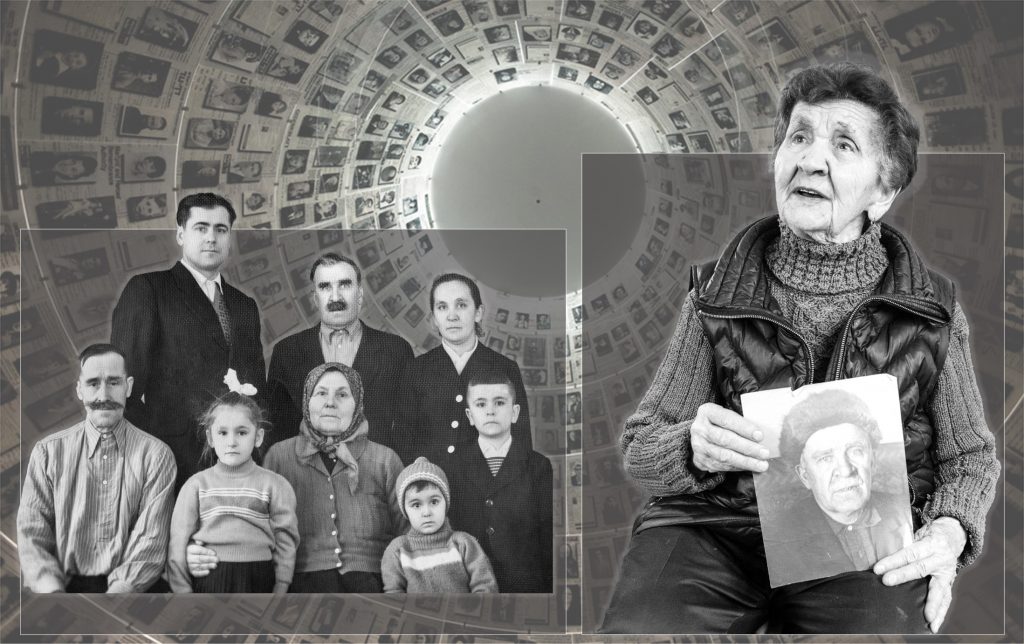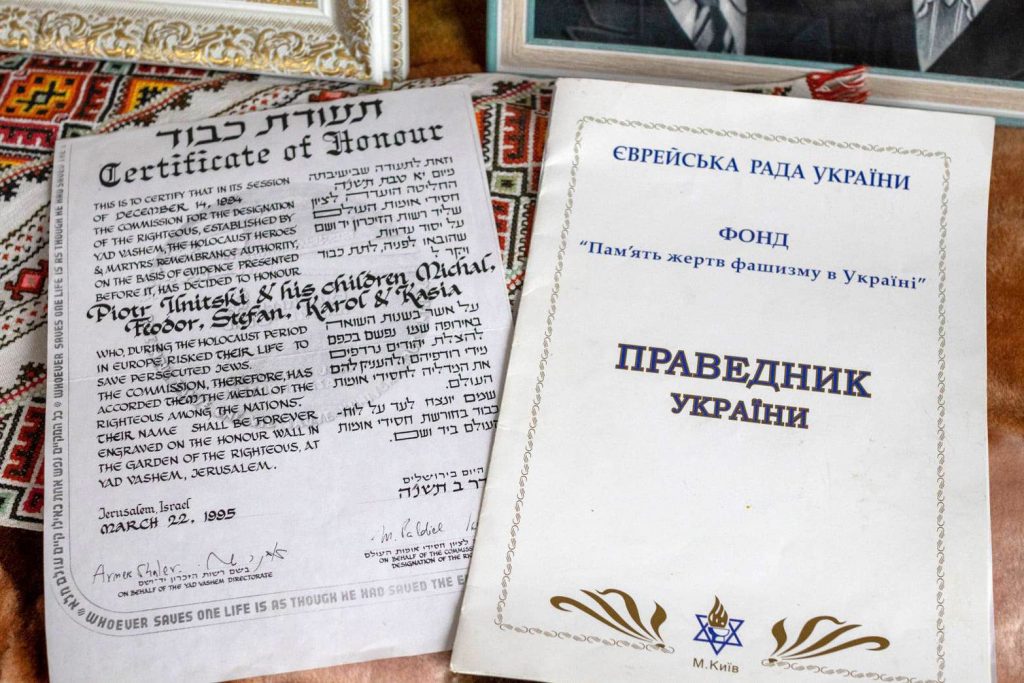Ukrainian Righteous: Ivano-Frankivsk
We continue our series of articles dedicated to the Ukrainian Righteous Among the Nations. This time, we will look at the Ivano-Frankivsk region.
For years, the Soviet authorities did everything to create the image of Ukrainians as antisemites and murderers. The heroic deeds of the Righteous Among the Nations were not publicized, and, as they lived in a state that kept track of every citizen's ethnicity, the Righteous themselves were often oppressed and endured humiliation and persecution by the KGB.
During the 30 years of Ukraine's independence, the Righteous were essentially forgotten; Ukrainian authorities did little to memorialize their deeds. Private and local initiatives, with the help of volunteers, predominantly aided the Righteous and the cause of preserving the memory of their acts.
The tragic stories of the Righteous Among the Nations can be found in the Ivano-Frankivsk (previously Stanislav) region. World War II is a difficult period in Ukrainian history. Many people in the region waited for Germans to liberate them from the Soviet regime [which had repeatedly oppressed Ukrainians, including instigating the Holodomor, a man-made famine in 1932-33 that claimed the lives of millions of Ukrainians who opposed Stalin's collectivization policies — Ed.].
According to the Yad Vashem Holocaust Memorial Center, there were 246 Righteous Among the Nations in the Stanislav region. Their stories illustrate exceptional heroism; German authorities often executed saviors and their families for saving Jews. After risking their lives to save Jews during the war, they had to endure the Soviet victor's antihuman machine. Many Ukrainians were forcibly resettled en masse to Central Asia or treated as third-class citizens, fighting discrimination and denied opportunities for professional growth.
Families of the Righteous Among the Nations from the Ivano-Frankivsk region suffered due to the KGB's policy of forcible resettlement of Ukrainians.
Anatoly Podolsky, director of the Ukrainian Center for Holocaust Studies, told UJE that many residents of Western Ukraine in the 1930s and 1940s (Poles, Jews, and Ukrainians) were victims of brutal terror by two totalitarian regimes — the Nazis and the Communists. "In 1939–1941, the Soviet authorities deported tens of thousands of residents from Eastern Galicia to Gulag camps after classifying them as undesirable and dangerous persons for Stalin's dictatorship," said Podolsky.
As Zhanna Kovba writes in Humanity in the Abyss of Hell, a book about the Holocaust in Galicia, "Ordinary Galicians — Ukrainians, Poles, and even Jews — began to pin their hopes on the Germans. ... The well-established understanding that every nation had its decent and dishonest people was tested by obsessive political clichés: enemies of the people, nationalists, and Zionists. In a letter to Cardinal Tisserant on December 26, 1939, Metropolitan Andrey Sheptytsky described the results of the first months under Soviet rule:
'This is a system in which everything that could be love or simply sincerity has been destroyed. Crowds of workers, representatives of the authorities, those from Kyiv and Moscow, and all of them seem to be empowered to rule absolutely arbitrarily, without having any defined tasks. The NKVD [Soviet secret police, a forerunner to the KGB— Ed.] recruits young people into its ranks, threatening and turning them into obedient executors of its will. All education is now governed by the state. The teaching of religion is prohibited; instead, there are clear trends to corrupt the youth through the propaganda of fanatical atheism. ... Trade has been completely nationalized — all goods were simply confiscated without any compensation and declared state property. ... There are no courts, lawyers, notaries, contracts, or appeals. There are no rights and no representatives of the central government, while local officials change like in a kaleidoscope.'"
Anatoly Podolsky said that the Nazi authorities mercilessly destroyed almost all Jewish communities in all the towns of Eastern Galicia in 1941–1944: "The Holocaust in these lands was one of the worst Nazi crimes. Some Jews were deported to the Belzec extermination camp, and some Jewish communities were destroyed on the spot. National Socialist Germany killed more than 400,000 Galician Jews in this region of Ukraine. Poles and Ukrainians were also subjected to repressions by the Nazis." He added that the communist regime, too, inflicted much harm on the local population at the end and after the Second World War, from 1944–1947.
"Poles were forcibly deported from the territories of Western Ukraine. The punitive bodies of Stalin's NKVD launched brutal repressions against the Ukrainian nationalist movement. In these territories, the Soviet regime accused Ukrainians of cooperation with the OUN and participation in the UPA, and people who simply lived there during the war and were not involved with any organization were charged. A person would face mortal danger just for being a Ukrainian born in Eastern Galicia. In the late 1940s and early 1950s, the NKVD sent thousands of Ukrainian families into camps, accusing people of 'betraying the Soviet fatherland,'" said Podolsky.
The most massive deportation of Ukrainians went down in history as "Operation West," when the Soviets resettled hundreds of thousands of people from Western Ukraine to Siberia and Kazakhstan. For example, the husband of Kateryna Sheremeta, Righteous Among the Nations from the Ilnytsky family, was deported to Kazakhstan just because he wore an embroidered shirt.
The Ilnytsky family: Deportation
We are honored to be friends with the Ilnytsky family. They saved 16 Jews from violent death. Before the Second World War, they lived in the village of Roztochky in the Stanislav region. During the occupation of Stanislav (now Ivano-Frankivsk), Petro Ilnytsky, a widower raising four sons and a small daughter, hosted 14 people — the Ginzburg, Grünschlag, and Kessler families and others. At the same time, his fellow villagers took several more Jewish families under their wing.
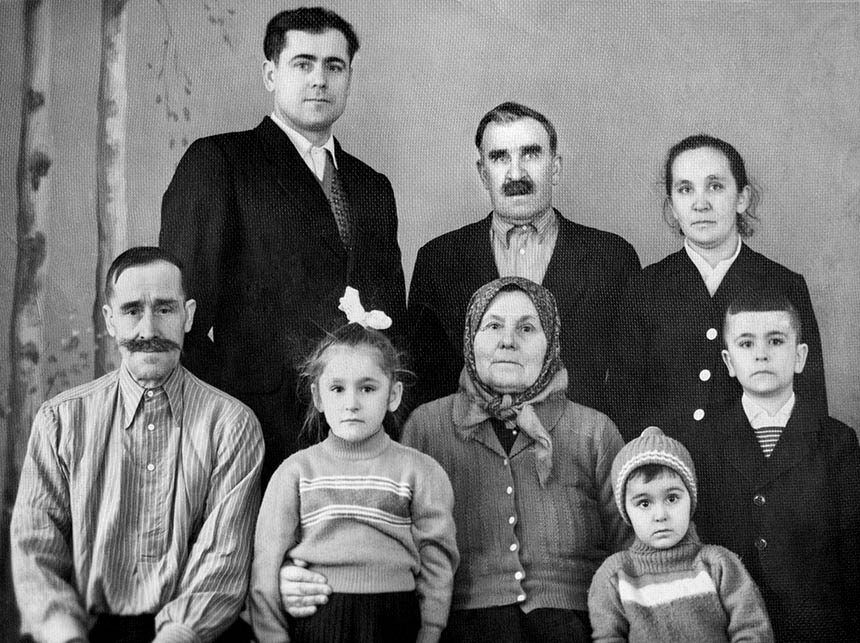
Abraham Grünschlag, one of the rescued persons, testified that Petro Ilnytsky was a firm believer and a highly decent person: "People in the villages only ate baked bread on holidays because there wasn't that much flour. Initially, we thought that he was saving us because of money, but we were wrong. The Ilnytskys bought food for the rescued and brought it to a hideout in the forest."
There were three bunkers in the woods where about 50 Jews lived. One of the bunkers was discovered by villagers during a hunt, and everyone there was shot within 48 hours.
Righteous Among the Nations Petro Ilnytsky
After learning about this, Ilnytsky moved the Grünshlag family to his house.
Some of the people remained in the forest bunker. "When it snowed, they couldn't come out of their hideout because others could see them," Kateryna Sheremeta, the Righteous Among the Nations and the youngest daughter of Petro Ilnytsky, told the Word of the Righteous project.
All 14 Jews rescued by Petro Ilnytsky and his children survived and left the Soviet Union, including for Australia.
According to Yad Vashem, "in 1946, the Ilnytskys were deported to Kazakhstan, and contact with the people they had rescued was lost for many years." By a remarkable coincidence, the family returned to their homeland after 20 years of exile in Karaganda.
In 2021, on Christmas Eve, I visited the Ilnytsky family in Ivano-Frankivsk, and the family sang the carol "Sad Christmas Eve in 1948".
"Sad Christmas Eve in 1948" is a carol about how Ukrainians were deported to Kazakhstan in 1948. This family of the Righteous Among the Nations Petro Ilnytsky and Kateryna Sheremeta was exiled from Ukraine for 20 years. They are singing about a Christmas Eve in a foreign land.
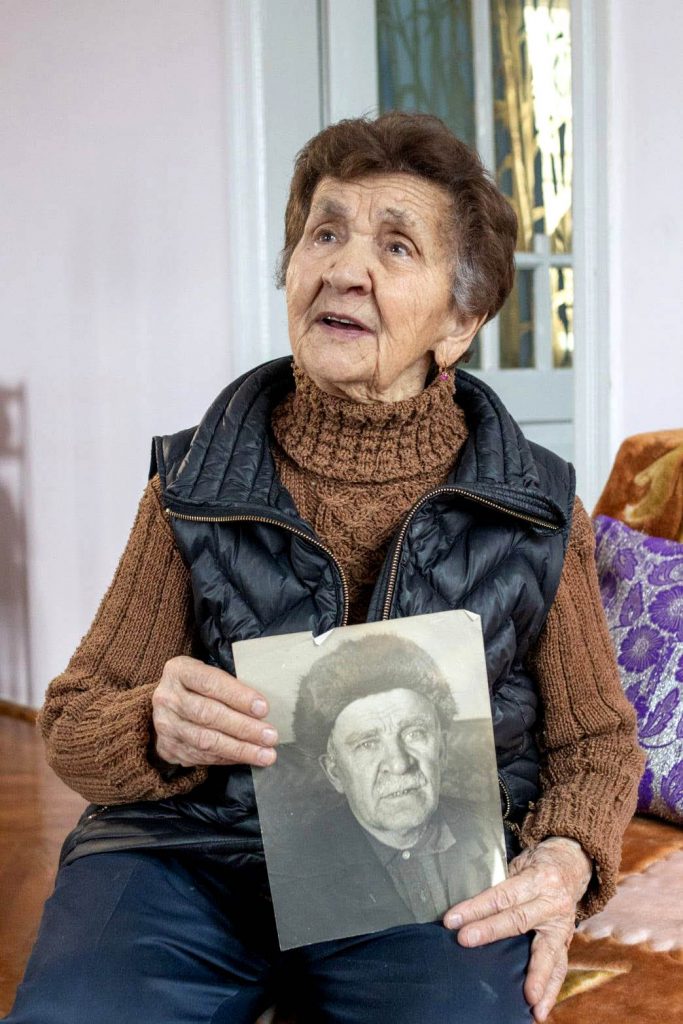
Yad Vashem also states, "it was only after the death of the rescuer in 1985 that his family was able to establish correspondence with some of them. On December 14, 1994, Yad Vashem awarded Petro Ilnytsky and his children — Vasyl, Stepan, Karol, Mykhailo, and Kateryna — the honorary title of Righteous Among the Nations."
With the beginning of the full-scale war of the Russian Federation against Ukraine on February 24, Israeli organizations invited the Ilnytskys to leave Ukraine many times. Still, the family refused, saying they preferred to stay in their house in Ivano-Frankivsk. They did not change their minds even when Russian missiles almost completely destroyed the Ivano-Frankivsk airport in early March 2022.
Kyrylo Kindrat: half a life under pressure
The Righteous Among the Nations Kyrylo Kindrat from the Ivano-Frankiv region also came under the attack of the Soviet authorities after the end of the Second World War. He was denied opportunities for career growth or development, even though he was highly educated.
According to Yad Vashem, Kyrylo Kindrat lived in the village of Staseva Volia of Stanisławów District (now the village of Sloboda in the Ivano-Frankivsk region). In the summer of 1943, Kindrat gave shelter to his former teacher, Professor Isaac Shlezinger. After his wife and two daughters were killed, Professor Shlezinger fled the Lviv ghetto.
"My classmates found Professor Shlezinger in the forest. And they brought him to me, saying that I could shelter a Jew as my house was located on the edge of the forest. He was a very learned person and knew 12 languages. He translated the Dead Sea scrolls," Kindrat said in an interview.
Kindrat prepared two shelters for Shlezinger: one in the attic of his barn and the other in the garden, in a pit for storing potatoes. "There was also a corner behind a large closet where he could hide," Kindrat said.
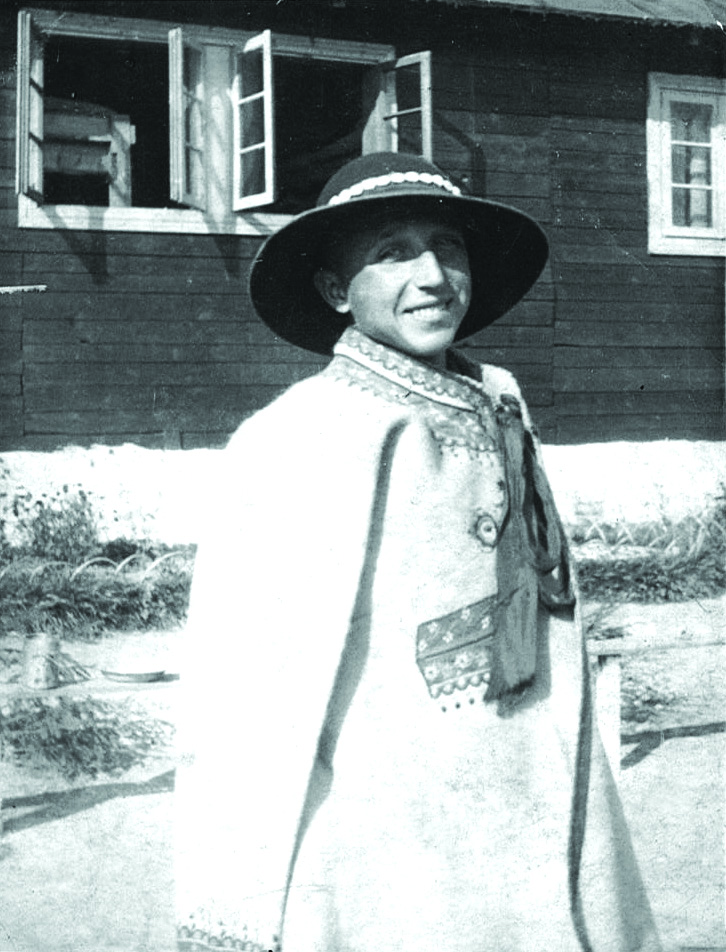
Yad Vashem's website states whenever strangers approached the house, Kindrat's dog, who lived in the house's yard, would start barking. During the year, Kindrat faithfully took care of Shlezinger and kept his presence in the house in strict secrecy until the district was liberated by Soviet Army units.
Professor Shlezinger told his rescuer: "I am poor as a saint. What can I give you? I would like to give you some keepsake." And he taught his rescuer the basics of English and Latin. Thanks to this, Kindrat graduated from the university and defended his Candidate of Sciences degree.
In the late 1940s, Shlezinger moved to Poland and, from there, emigrated to Israel. He corresponded with Kindrat over the years.
In the 1970s, Isaac Shlezinger lived in Israel. He found his rescuer and invited him to Israel. After that, Kindrat started having problems at work in the KGB style: his job was given to another person; he was not renewed at work, transferred to Hlukhiv University, and fired precisely at the age of 60.
Professor Shlezinger even appealed to the Polish academician Mykola Kazakiewicz to help stop the persecution of Kindrat and demanded that the Soviet authorities stay away from him.
It was only after Ukraine declared independence that Kindrat was given back his Associate Professor title and received a job at Rivne University. In December 1993, Yad Vashem recognized Kindrat as a Righteous Among the Nations.
"I decided to organize the Association of Christian Rescuers, those who saved not only Jews but also prisoners of war. My goal was for them to be recognized as Righteous Among the Nations or WWII participants," Kindrat said.
Thanks to his efforts, the names of 76 Righteous Among the Nations from the Rivne region, among others, became known worldwide.
We were fortunate to talk with Kindrat's widow Maria and his son Vadym. A documentary film about the Righteous Among the Nations — the Ilnytsky family and Kyrylo Kindrat — from the Word of the Righteous series can be viewed on YouTube:
Marharyta Ormotsadze
Marharyta Ormotsadze is a co-founder/producer of the Word of the Righteous project, which tells about the valor of Ukrainians who saved Jews throughout Ukraine during the Holocaust.
All photos: Word of the Righteous and personal archives of the Righteous.
Read related articles:
Righteous Street: How Ukrainian cities honor the Righteous Among the Nations
Righteous Street: How Ukrainian cities honor the Righteous Among the Nations (part 2)
Ukrainian Righteous Among the Nations and war: how the aggressor tries to erase history







